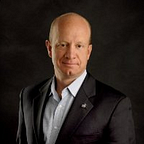Leaders Must Also be Followers
Don’t let your high horse fool you
There’s no such thing as a being either a leader or a follower.
In fact, I’m a big proponent of ignoring the either-or proposition altogether.
Believing “You’re either this or you’re that” is a negative way to try and quantify someone.
We are all often a mishmash of things that are not so easily defined in a binary.
I’d much rather focus on an ‘and’ proposition rather than an ‘or’ proposition. You can surely be more than one thing at a time, especially in the workplace.
There are dozens of articles out there proclaiming that if you are not a leader, you are doing something wrong or you are not achieving your potential. The most classic incarnation of this idea clearly states that if you are not a leader, you are a follower. There is often a shameful tone that the idea takes.
I disagree with that basic idea because, no matter how high one may climb in an organization, you are always a leader and a follower.
In fact, great followership, the ability to be led and know what it’s like to be a follower, makes you a better leader. You have an empathy and appreciation for what it takes to be led because you are being led.
Likewise, as a leader, you’re empathetic to the people that you lead, where they are, and how you can move them to where they need to be. Helping people actualize their full potential becomes far easier with the empathy you gain from being a follower and a leader all at once.
Rather than thinking this or that, why not ponder on this and that?
That is, to me, a fundamental reframing of the way we think. In fact, it’s a great discipline to have in your life.
Now as to leadership in a business context, the CEO, the chairman of the board are still followers. They are all taking their lead strategically, or operationally, from someone above them in some way. The CEO reports to the board, the board can hire and fire the CEO, the chairman of the board reports to the board members — and everyone, everywhere, is following advice from other leaders and mentors.
Be mindful of the fact that you think you’re a leader and you have no one to follow.
There is a big misconception when we talk about leadership that frequently assumes we should aspire to be, and look up to, a leader as the big boss to end all bosses. There is never someone that actually sits on top and doesn’t have someone that they report to. There is always a circular chain of command.
Operationally there should always be someone to follow or else you’re incomplete in terms of organization structure.
Even if this chain of accountability seems to have a preeminent executive, the greatest of leaders still look for mentors, people that you can hold yourself accountable to and learn from.
I have noted this method in another article of mine, but in all of my own businesses I have someone with whom I have purposely created a Mutual Improvement Association, or MIA. I’ve sat them down and said, “Hey [insert a name here], you know me, you know what I do, and you know what I’m capable of. I give you my full permission to correct me when you see me operating in a substandard way.”
Sometimes those in the MIA are people are in the organization and sometimes they are outside the org chart because there’s a previously established business relationship there. Sometimes they are someone completely unrelated to the enterprise.
There should always be trust between you and the people you work with, but there are always risks that people do not want to keep you accountable. The job here is for me to grow myself, to be mentored by someone even though, structurally, I don’t report to them.
What if you aren’t very high on the organizational chart? How can you be a leader then?
Be the person a leader can rely on to rally the team if they need it. Be the person who gets asked to help with a project, or better yet, be the person who offers to help on a project when you have the room on your plate. Check in with your co-workers just to see how things are going.
There are plenty of smaller ways in which someone in a non-leadership role can still build and sharpen their leading skills.
If you have aspirations to grow into a larger role, these skills will be just as essential as the empathy I mentioned earlier.
If you can find the intersection of being a leader and a follower, you’ll see yourself more clearly, you’ll be able to be a better member of the team and, in time, more skillfully lead that team.
Don’t think in terms of either-or, think in terms of and.
If your mindset improves in this way, so too will your output and productivity.
Aaron Webber is a serial entrepreneur and CEO of Webber Investments LLC, as well as a Managing Partner at Madison Wall Agencies.
If you liked this post, please press the like button and leave any questions or comments below.
Check out my Quora, & LinkedIn pages for more.
